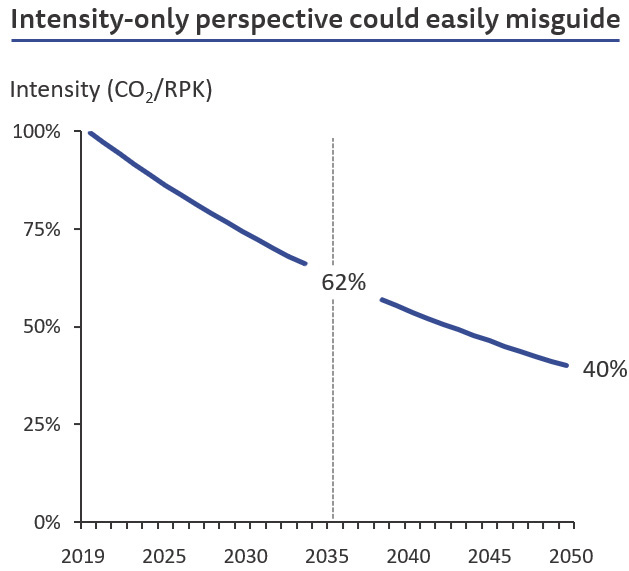
impact aims for collaborative solutions
impact members are charting a common path to sustainable aviation. This discursive and collaborative approach has already forged a common understanding about the KPIs that are crucial to decarbonize the industry. impact‘s focus lies on measuring the decoupling of aviation‘s CO₂ emissions from the industry‘s economic output by using three essential KPIs.
Net zero emissions will be aviation’s license to operate in a cleaner future.

impact’s milestone concept to decarbonize aviation
Decoupling “decarbonization progress“ and “air traffic growth“ can be translated directly into a simple, accurate scoring system that will be as watertight against greenwashing as conceivably possible. Our milestone concept renders assumption-based models and forecast-based benchmarks superfluous. It’s focus is on assessing whether an airline or lessor has achieved a certain sustainability score, how many hurdles have yet to be achieved by 2050, and how this compares with other airlines and lessors.
The Great Decoupling of air traffic and emissions trends
impact’s approach differs from others
impact wants aviation to decouple emissions trends from air-traffic growth – so that eventually CO₂ volumes decline even as air traffic keeps growing. Other approaches focus on emissions intensity (CO₂/RPK). But monitoring only intensity can flag “improvements” that disguise overall emissions trends.
impact also wants to bring together airlines, financiers, investors, renewable energy providers and tech innovators to generate investment in new technology – for example, the production of sustainable aircraft fuels (SAF production) and carbon capture.
Finance is a powerful lever
Regulators all over the world see finance as a crucial lever for efforts to lower emissions. For example, the EU Taxonomy Regulation gives financial institutions a major role in pushing aviation to net zero by 2050. Aviation financing companies have the power to demand more emissions transparency from airlines and agree transition-finance standards.

Transparency is key
Transparency is the key to decarbonization of the airline industry. impact wants all aviation stakeholders to adopt three clear and simple KPIs to throw authoritative light on emissions and allow target-setting and monitoring. The KPIs would measure their
- Emissions footprint, or total volume of CO₂ emitted by a carrier over a year,
- Emissions intensity, or CO₂ needed to transport a standard capacity unit,
- Emissions decoupling, or how closely emissions are linked to air-traffic trends.
impact suggests to substitute assumption-heavy and thus potentially unstable forecasts as reference yardsticks in loan or lease agreements. Instead, impact proposes using different levels of increasingly difficult-to-achieve thresholds for a simple and transparent scoring system (“milestones”). Milestones are defined by categories of capacity growth and decarbonization. Once an airline has accomplished a particular milestone, its sustainability score rises accordingly.
No assumptions or forecasting models would be required to set appropriate milestones, the rules are fully transparent, and the thresholds remain constant until 2050. The concept of milestones is analytically sound and easy to understand, interpret and implement.
A meaningful approach will ascertain long-term availability of capital.
